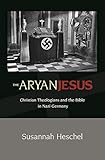The Aryan Jesus : Christian Theologians and the Bible in Nazi Germany / Susannah Heschel.
Material type: TextPublisher: Princeton, NJ : Princeton University Press, [2022]Copyright date: ©2008Description: 1 online resource (384 p.) : 30 halftonesContent type:
TextPublisher: Princeton, NJ : Princeton University Press, [2022]Copyright date: ©2008Description: 1 online resource (384 p.) : 30 halftonesContent type: - 9781400851737
- Church and state -- Germany -- History -- 1933-1945
- German-Christian movement
- Holocaust, Jewish (1939-1945) -- Causes
- Judaism (Christian theology) -- History of doctrines -- 20th century
- National socialism and religion
- Protestant churches -- Germany -- History -- 20th century
- RELIGION / Christian Theology / History
- Abel, Wolfgang
- Altenburg, church in
- Angelos
- Arische Rundschau
- Assyriology
- Augsburg Confession
- Babylonian mythology
- Barmen Declaration (1934)
- Bayreuth Blätter
- Birnbaum, Walter
- Buchenwald concentration camp
- Call of Life
- Catholicism
- Conti, Leonardo
- Dalman, Gustav
- Deutsches Christentum
- Dungs, Heinz
- Enlightenment philosophy
- Ericksen, Robert
- Faulhaber, Michael von
- Frank, Walter
- Generalanzeiger
- Gilgamesh epic
- Grundmann, Emil
- Happich, Karlheinz
- Heinsdorff, Emil Ernst
- Hellenism
- Hoffmann, Richard
- Indology
- Institutum Judaicum
- Jesus
- Johannsen, Hermann
- Josephus
- Kerrl, Hanns
- Kristnallnacht pogrom
- Lincoln, Bruce
- Ludendorff, Erich
- Mauersberger, Erhard
- Mendelssohn, Moses
- Military Field Hymnal
- Nordland
- Nuremburg Laws
- Oberheid, Heinrich
- Our Fighting Songs
- catechism revision
- church interiors
- euthanasia programs
- free churches
- incarnational theology
- miscegenation
- monogenesis
- nationalism, German
- 274.3/0823 22
- BR856 .H476 2008eb
- online - DeGruyter
| Item type | Current library | Call number | URL | Status | Notes | Barcode | |
|---|---|---|---|---|---|---|---|
 eBook
eBook
|
Biblioteca "Angelicum" Pont. Univ. S.Tommaso d'Aquino Nuvola online | online - DeGruyter (Browse shelf(Opens below)) | Online access | Not for loan (Accesso limitato) | Accesso per gli utenti autorizzati / Access for authorized users | (dgr)9781400851737 |
Frontmatter -- Contents -- List of Illustrations -- A Note on Archival Sources -- Acknowledgments -- List of Abbreviations -- Introduction. Theology and Race -- Chapter I. Draining Jesus of Jewishness -- Chapter II. The Institute for the Study and Eradication of Jewish Influence on German Church Life, 1939 to 1942 -- Chapter III. Projects of the Institute -- Chapter IV. The Making of Nazi Theologians -- Chapter V. The Faculty of Theology at the University of Jena -- Chapter VI. The Postwar Years -- Conclusion. Crucified or Resurrected: Institute Theology in Postwar Germany -- Bibliography -- Illustration Permissions -- Index -- Scriptural Citations Index
restricted access online access with authorization star
http://purl.org/coar/access_right/c_16ec
Was Jesus a Nazi? During the Third Reich, German Protestant theologians, motivated by racism and tapping into traditional Christian anti-Semitism, redefined Jesus as an Aryan and Christianity as a religion at war with Judaism. In 1939, these theologians established the Institute for the Study and Eradication of Jewish Influence on German Religious Life. In The Aryan Jesus, Susannah Heschel shows that during the Third Reich, the Institute became the most important propaganda organ of German Protestantism, exerting a widespread influence and producing a nazified Christianity that placed anti-Semitism at its theological center. Based on years of archival research, The Aryan Jesus examines the membership and activities of this controversial theological organization. With headquarters in Eisenach, the Institute sponsored propaganda conferences throughout the Nazi Reich and published books defaming Judaism, including a dejudaized version of the New Testament and a catechism proclaiming Jesus as the savior of the Aryans. Institute members--professors of theology, bishops, and pastors--viewed their efforts as a vital support for Hitler's war against the Jews. Heschel looks in particular at Walter Grundmann, the Institute's director and a professor of the New Testament at the University of Jena. Grundmann and his colleagues formed a community of like-minded Nazi Christians who remained active and continued to support each other in Germany's postwar years. The Aryan Jesus raises vital questions about Christianity's recent past and the ambivalent place of Judaism in Christian thought.
Mode of access: Internet via World Wide Web.
In English.
Description based on online resource; title from PDF title page (publisher's Web site, viewed 31. Jan 2022)


